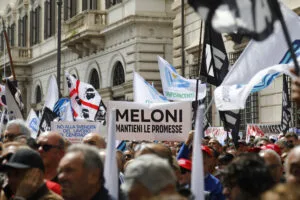Brussels – Nearly two decades have passed, yet the saga of beach concessionaires against the Bolkestein directive is still setting Italian beaches on fire. The Italian Federation of Public Establishments (the Confcommercio association representing the tourism businesses) and Confesercenti trade union federation (representing beach concessionaires) will strike tomorrow (Aug. 9) for two hours – between 7.30 a.m. and 10:30 a.m., protesting against the government led by Giorgia Meloni who, despite electoral promises, has failed to block beach concessions tenders envisaged by EU legislation. Despite opposition from current operators of beach establishments, concession activities, and state-owned areas, with a 15-year delay, the auctions will finally be held in 2025. The saga seems to be heading toward an end because the Italian government has run out of tools to justify to Brussels the continued extraordinary delay in the expiration of concessions.

Tomorrow’s strike is only the first of a shutdown that, if the government in Rome fails to respond, will be repeated on August 19 for four hours (7:30 a.m. to 11:30 a.m.) and August 29 for eight hours (7:30 a.m. to 3:30 p.m.). After the last delay included in the first budget law approved by the Meloni government in December 2022 – which extended the expiration of concessions until the end of 2024 – no viable solution has been found for this year to block the auctions: as of January 2025, Italy, therefore, will have to comply with the 2006 EU directive on services in the Common European Market. Beach concessionaires, however, denounce the lack of shared criteria at the national level, which prevents the definition of harmonious rules between local authorities for the allocation of concessions, and they demand the recognition of economic compensation for outgoing concessionaires despite the Court of Justice of the European Union contrary ruling on this matter.
Beach concessionaires vs. Bolkestein, 2006 to the present
Beach concessionaires are just one of several categories of workers in Italy who oppose the Bolkestein directive, as are peddlers and taxi drivers. The directive approved by the European Parliament and the EU Council (representing all national governments) in 2006 is a type of EU legislation that must be transposed into the law of each member state. Italy did so in 2010, under the last government led by Silvio Berlusconi, and, since then, it has the force of law throughout the country and in other EU member states. Violation of an EU directive can lead to the opening of an infringement procedure by the European Commission and, in case of continued non-compliance, a referral to the EU Court of Justice and the imposition of a fine.

The directive is named after the former European commissioner responsible for the Internal Market in the Prodi Commission (1999-2004), Dutch Frits Bolkestein. It aims to promote the development of a free and fair European Single Market for goods and services, avoiding zones of privilege or protectionism and eliminating barriers between states. The directive has three pillars: freedom of establishment and one-stop shops, free movement of services, and collaboration among member states. The central point is in the second pillar, which provides freedom of movement of services but only temporarily and for a limited period. Under this EU legislation, any EU citizen can temporarily sell their services in any member country without protectionism. That is why the 27 member states must regularly open calls for tenders for concessions on public areas – such as beaches – to foster competition and provide a better service to consumers.
However, in Italy, professional categories — such as beach concessionaires – have always opposed the so-called Bolkestein directive. Beach concession licenses are passed from generation to generation or through informal ways, breaching European legislation in force as a law in Italy for almost 15 years. To avoid a clash with Brussels, from 2006 to the present, Italian governments of all political persuasions have extraordinarily postponed the expiration of beach concessions, extending them (and thus continually delaying the opening date of the calls for bids). As early as July 14, 2016, the Court of Justice of the EU ruled that authorizations for the use of the coastal strip cannot be automatically renewed but must be subject to a selection procedure, a rejection of the Italian system that Luxembourg judges reiterated on April 2023.

Several rulings of the Council of State (second level of administrative justice) — recognizing the precedence of EU rules on extensions granted by previous governments and ruling that beach concessions cannot be automatically renewed — are pending over the Italian executive. Also, following the infringement procedure initiated on December 3, 2020, the European Commission sent a reasoned opinion (the second step in the procedure) on November 16, 2023 – without giving too much publicity to the decision – inviting the Meloni government to respond within two months to avoid proceeding further, i.e., referring Italy to the EU Court of Justice, with the risk of subsequent heavy fines.
The response from Rome came at the last possible moment, on January 16. Since then, the EU executive has been reviewing and analyzing the case (a decision was expected after the June 6-9 European elections), particularly mapping the coastline to prove the exception under the principle of scarcity of property. However, in a July 11 ruling, the Luxembourg court deliberated that at the end of the beach concession, the state can automatically expropriate what was built by those who received permission to manage public land “free of charge and without compensation.”
English version by the Translation Service of Withub

![[foto: Emanuele Bonini]](https://www.eunews.it/wp-content/uploads/2024/06/balneari2-350x250.jpeg.webp)



